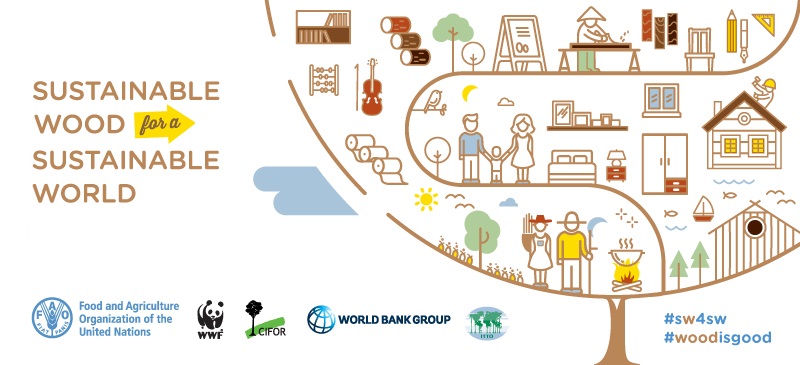
Sustainable Wood for a Sustainable World (SW4SW) promotes sustainable wood products and their value chains by advancing nature-based solutions to tackle the climate emergency and contribute to the achievement of the Sustainable Development Goals. A joint initiative of the Collaborative Partnership on Forests (CPF), SW4SW works with governments, private sector, civil society, and academia in developing and strengthening sustainable wood value chains to further generate social, economic and environmental benefits throughout production and consumption.
Established in 2018, SW4SW is led by FAO and co-led by the International Tropical Timber Organization (ITTO) working together with the Center for International Forestry Research (CIFOR), the Secretariat of the Convention on International Trade in Endangered Species of Wild Fauna and Flora (CITES-Secretariat), the World Bank and the International Union of Forest Research Organizations (IUFRO).
The sustainable use of natural resources, including forests, is a key tenet of the 2030 Agenda for Sustainable Development. The 2015 Paris Agreement also highlights the contribution of forests to mitigate and adapt to climate change. Technical and methodological progress facilitates better monitoring of the life cycle of harvested wood products, giving them a key role in strategies for transitioning to low-carbon economies. Concurrently, sustainable forest management is enhancing livelihoods, contributing to landscapes, impacting cities and reducing the world’s carbon and material footprints.
Despite these positive impacts, sustainable production and consumption of wood products have received little attention on the international development agenda, partly due to persistent unsustainable practices. This has contributed to low levels of finance and poor marketing for sustainable wood value chains. It is therefore crucial to increase the visibility of the benefits of sustainable wood production and consumption, shifting mindsets to encourage a more positive and responsive attitude to develop and strengthen sustainable wood value chains.
Joint efforts are essential to improve understanding of (i) what sustainable wood value chains entail; (ii) where they can be found, created or strengthened; (iii) what business models are associated with them; and (iv) how they can better contribute to achieving development goals at different levels.
SW4SW encourages the due consideration of wood as sustainable material to drive the achievement of improved forest management, enhanced livelihoods, and climate-resilient societies. The initiative aims to improve decision-making, catalyze investments, and disseminate critical innovation to include sustainable wood production and use in strategies and action plans to achieve the Sustainable Development Goals, Global Forest Goals, the UN Decade of Ecosystem Restoration, UN Decade of Family Farming, Green Cities, and climate change objectives.
The initiative targets primary wood value chain stakeholders (including producer associations), industry associations, small and medium enterprises (SMEs), policymakers, governments, the financial sector, non-forest sectors, consumers, multilateral mechanisms and opinion shapers.
As an umbrella initiative, SW4SW relies on the collaborative activities of its partner organizations (and a broad range of stakeholders along the value chains) to improve decision-making in public and private sectors. It catalyzes action through engagement with relevant stakeholders in policy dialogues, investment forums, value chain assessments, and awareness-raising activities, that deliver priority roadmaps and create momentum for action. SW4SW supports the development of policy and legal frameworks, institutional arrangements, knowledge generation and dissemination, market solutions, and resource mobilization, including through the promotion of positive linkages with other environmental and socioeconomic interventions.
Outcome 1: Benefits from sustainable wood products and their value chains are fully recognized in international policy dialogues, sustainable development and climate change strategies and national policy frameworks.
Outcome 2: Capacity to manage forests for sustainable wood production in the context of sustainable land management is developed at all levels.
Outcome 3: Markets and finance for sustainable wood value chains and sustainable wood products are broadened.
Outcome 4: Sustainable wood value chains and contributions of sustainable wood products to the bioeconomy and circularity approach are strengthened in both developed and developing countries.